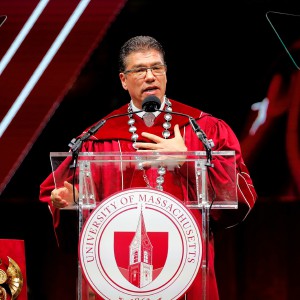Amherst council proposal to curb public comment sets off residents
| Published: 03-08-2023 6:41 PM |
AMHERST — A proposal to limit public comment at Town Council meetings to 30 minutes and restrict access for nonresidents is drawing fire from some who say the change is a “bad look,” unnecessary and a way to silence marginalized communities.
“This not a good look for Amherst to limit the time for public comment, when many meetings that have gone long on comment have been regarding issues around racial equity,” Darcy DuMont, a former District 5 councilor, said at Monday’s council meeting.
The proposal is being floated as a way to streamline meetings that often go four or more hours.
The revisions were recently recommended by the council’s Governance, Organization and Legislation committee, but came under fire from more than a dozen residents who offered oral and written reaction to the proposal. The Town Council voted to refer the matter back to its subcommittee for more study.
The main change being proposed is to the public comment period in the written rules that guide the council. An addition to those rules and procedures states, “Once the public comment period has reached 30 minutes, the council may pause public comment and move to the action item section of the agenda. The council may return to public comment once all votes on the agenda are complete.”
At Large Councilor Mandi Jo Hanneke said she proposed the changes, as there are numerous ways for the public to communicate with councilors at and outside meetings. Hanneke said the idea was to start a conversation on the role of public comment and whether certain comments were being privileged under the current policies.
“I was actually surprised it made through GOL on a unanimous recommendation, with one absent, because I expected a conversation to be started,” Hanneke said.
Hanneke’s research shows that Amherst would not be out of line in comparison to other towns. Holyoke has a 10-speaker limit, at 90 seconds each, and Northampton has a 90-minute total limit on public comment, while Melrose has a 10-minute total limit.
Article continues after...
Yesterday's Most Read Articles
 June dates set for big school vote in Belchertown
June dates set for big school vote in Belchertown
 Don Michak: Dig deeper after scandalous court ruling in Soldiers' Home case
Don Michak: Dig deeper after scandalous court ruling in Soldiers' Home case
 Susan Tracy: Support Ukraine funding
Susan Tracy: Support Ukraine funding
 Political newcomer defeats Shores Ness for Deerfield Selectboard seat
Political newcomer defeats Shores Ness for Deerfield Selectboard seat
 Granby Bow and Gun Club says stray bullets that hit homes in Belchertown did not come from its range
Granby Bow and Gun Club says stray bullets that hit homes in Belchertown did not come from its range
 Annette Pfannebecker: Vote yes for Shores Ness and for Deerfield
Annette Pfannebecker: Vote yes for Shores Ness and for Deerfield
Somerville and Leominster don’t put public comment on the agenda, and registration in advance is required in Agawam, Pittsfield and Watertown.
Still, District 3 Councilor Dorothy Pam said the reaction she has received from residents is outrage, adding that if the comment period lasts a long time it’s because people feel strongly about an issue.
“I’m very upset that these suggestions were even put forward,” Pam said.
At Large Councilor Ellisha Walker said the rules shouldn’t change, that public comment should be first on the agenda, calling it an equity issue for people who can’t be part of sessions lasting deep into the night.
District 5 Councilor Ana Devlin Gauthier said capping the comments time at 30 minutes is concerning when that limit is not always reached.
“We have other ways of saving time — it’s not typically a long public comment that drags us late,” said District 4 Councilor Pamela Rooney said. “Most of the time public comment is fairly quick.”
The other major proposed change to council meeting rules is that “nonresidents, and any person not on the register or having their hand raised in a virtual meeting prior to the first public comment, will be recognized to speak at the discretion of the presiding officer and only if public comment has not already exceeded 30 minutes.”
Anita Sarro of Chapel Road said she was puzzled by the idea that public comment time was a problem. “I’m confused and a little troubled about what the conversation was that needed to start,” Sarro said.
“We are independent speakers in this town, and I do hope we continue to do that,” Sarro said.
Meg Gage of Montague Road said revisions to the rules of procedure may be needed, but “it’s a bad look” to try to reduce public comment.
The regions’ communities are interconnected and it is not right to limit nonresidents, said Kaylee Brow of Hadley, who lives only minutes from the town line.
Philip Avila, a member of the Human Rights Commission, noted that sessions that go long have focused on racism and policing issues.
“In my mind, it’s a manipulation technique,” Avila said, adding that the idea appears to be to silence marginalized communities.
Brianna Owen of North Amherst said reducing public comment is upholding white supremacy and would be destroying democracy by limiting perspectives from different people. Owen said she appreciates virtual input and hope it remains.
“The council is a white space, even for me it gives me anxiety to speak, and if I went in person it would be even worse,” Owen said.
Carol Gray of South East Street noted that the town has already lost the 240 Town Meeting members who represented residents, leaving decisions to be made by 13 councilors. “People need to be listened to,” Gray said.
Ira Bryck of Strong Street wrote that people already feel disregarded and the promise of Town Council was more public input, not less.
“And then there is the thing about Amherst being the town where only the ‘H’ is silent,” Bryck wrote. “This kind of thing is counter to our brand. Our government should capture our perspectives, not work around them.”

 Jones trustees ask Amherst town manager to reject library bid
Jones trustees ask Amherst town manager to reject library bid UMass chancellor defends protest crackdown, arrests
UMass chancellor defends protest crackdown, arrests Sharing a few notes: High schoolers coaching younger string players one on one
Sharing a few notes: High schoolers coaching younger string players one on one Reyes takes helm of UMass flagship amid pro-Palestinian protests
Reyes takes helm of UMass flagship amid pro-Palestinian protests